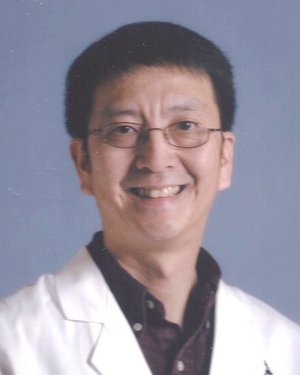Background
Titles
- Director, Experimental Therapeutics Ludwig Center for Cancer Genetics and Therapeutics at Johns Hopkins
- Professor of Oncology
Departments / Divisions
- Oncology - Cancer Genetics and Epigenetics

Molecular Genetic Analysis of Cancer; Targeted Cancer Immunotherapy ...read more
Hypoxia, a consequence of tumor cells outgrowing their blood supply, and subsequent angiogenesis are two of the hallmarks of rapidly growing solid tumors. Dr. Zhou's laboratory has been exploiting these unique pathological features for developing novel therapeutic approaches.
The hypoxic tumor compartment poses challenges for both chemo and radiation therapies as hypoxia diminishes the therapeutic effects of chemotherapeutic agents and radiation. Conversely, this tumor compartment, hypoxic and immune-privileged, provides a unique niche for anaerobic bacteria to grow. C. novyi-NT is an attenuated strain of the anaerobic bacterium Clostridium novyi. When injected intravenously, C. novyi-NT spores are not toxic to healthy animals but can selectively germinate within and colonize tumors, resulting in massive necrosis and tumor regression. In addition to direct tumor destruction by bacterial growth, the C. novyi-NT infection elicits a potent host antitumor immune response leading to long-term cures. C. novyi-NT is considered a promising anticancer agent not only for its inherent anticancer properties, but also for its capacity to enhance other cancer therapies and to serve as a tumor-specific gene therapy vector. Dr. Zhou's laboratory has combined C. novyi-NT spores with chemotherapeutic drugs, liposomal formulation of chemotherapeutic drugs, and radiation for the treatment of several experimental tumor models. The combination therapies showed marked improvement in efficacy over the therapies using individual agents.
This line of investigation has also led to the observation that the efficacy of immune checkpoint blockade can be substantially enhanced by epigenetic modulation. Myeloid Derived Suppressor Cells (MDSCs) were later identified as the target of the epigenetic inhibitors. Based on these promising preclinical studies, two Phase I trials have been conducted, one with C. novyi-NT and the other with entinostat plus pembrolizumab.
More recently, Dr. Zhou's group has been leading an effort to develop therapeutic approaches based on scFvs specifically targeting driver mutation-derived neoantigens presented by HLA molecules, which in theory would provide the highest specificity against cancer cells. The most promising candidate scFvs against neoantigens derived from several common mutations in the RAS and TP53 genes have been converted to therapeutic formats such as T cell-engaging bispecific antibodies and used to engineer CAR T cells or TCR-CAR T cells. Extensive investigation of these therapeutic platforms demonstrated their potency and specificity both in cell culture systems and in mouse tumor models. The objective is to develop a suite of therapeutic agents targeting the most common driver mutation-associated neoantigens and translate them into tissue-agnostic cancer therapies.
Hsiue EHC, Wright KM, Douglass J, Hwang MS, Mog BJ, Pearlman AH, Paul S, DiNapoli SR, Konig MF, Wang Q, Schaefer A, Miller MS, Skora AD, Azurmendi PA, Murphy MB, Liu Q, Watson E, Li Y, Pardoll DM, Bettegowda C, Papadopoulos N, Kinzler KW, Vogelstein B, Gabelli SB, Zhou S. Targeting a neoantigen derived from a common TP53 mutation. Science 371, eabc8697 (2021).
Douglass J, Hsiue EHC, Mog BJ, Hwang MS, DiNapoli SR, Pearlman AH, Miller MS, Wright KM, Azurmendi PA, Wang Q, Paul S, Schaefer A, Skora AD, Dal Molin M, Konig MF, Liu Q, Watson E, Li Y, Murphy MB, Pardoll DM, Bettegowda C, Papadopoulos N, Gabelli SB, Kinzler KW, Vogelstein B, Zhou S. Bispecific antibodies targeting mutant RAS neoantigens. Sci. Immunol. 6, eabd5515 (2021)
Pearlman AH, Hwang MS, Konig MF, Hsiue EHC, Douglass J, DiNapoli SR, Mog BJ, Bettegowda C, Pardoll DM, Gabelli SB, Papadopoulos N, Kinzler KW, Vogelstein B, Zhou S. Targeting public neoantigens for cancer immunotherapy. Nat Cancer. 2021 May 17; 2(5):487-497
Zhou S, Gravekamp C, Bermudes D, Liu K. Tumor-targeting bacteria engineered to fight cancer. Nature Reviews Cancer.
Staedtke V, Bai RY, Kim K, Darvas M, Davila ML, Riggins GJ, Rothman PB, Papadopoulos N, Kinzler KW, Vogelstein B, Zhou S. Disruption of a self-amplifying catecholamine loop reduces cytokine release syndrome. Nature. 2018 Dec; 564(7735):273-277
Patient Ratings & Comments
The Patient Rating score is an average of all responses to physician related questions on the national CG-CAHPS Medical Practice patient experience survey through Press Ganey. Responses are measured on a scale of 1 to 5, with 5 being the best score. Comments are also gathered from our CG-CAHPS Medical Practice Survey through Press Ganey and displayed in their entirety. Patients are de-identified for confidentiality and patient privacy.